The Role of Medication Management in Preventing Relapse After Detox

Understanding the Importance of Medication in Relapse Prevention
In the journey of recovering from substance use disorders, detoxification is merely the initial step. The real challenge often lies in maintaining sobriety post-detox, where the risk of relapse looms large. An integral component in this ongoing battle is the strategic use of medication management. This approach not only aids in managing withdrawal symptoms but also plays a pivotal role in long-term relapse prevention. This article explores how combining medication with therapy can maximize recovery efforts, detailing key strategies and medications used in preventing relapse.
Medication's Role in Surviving Addiction Recovery
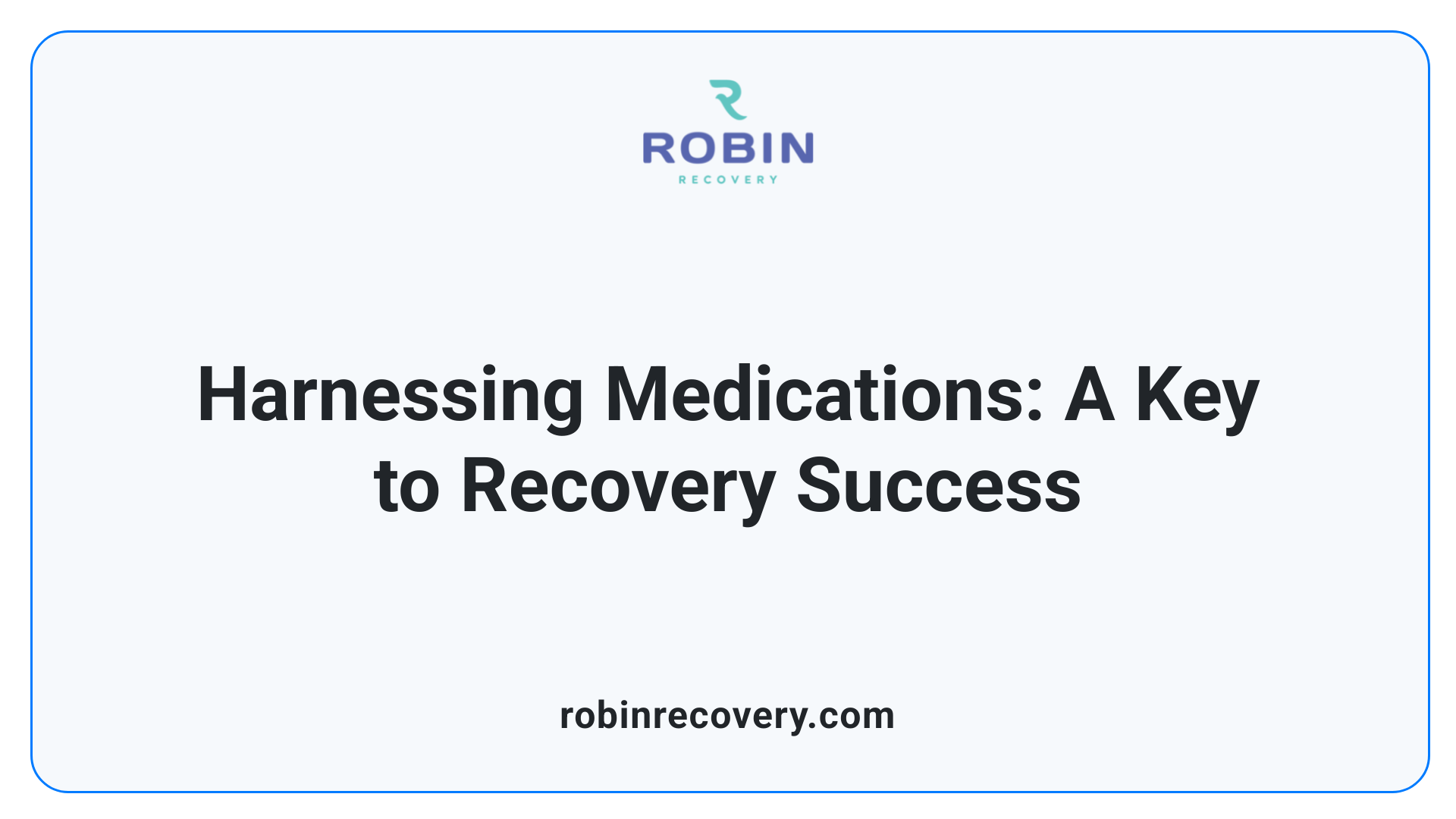
What is the role of medication in addiction recovery?
The role of medication in addiction recovery is crucial, as it often involves a tailored approach combining FDA-approved medications and therapy to meet individual needs. This combination has been shown to improve patient survival, increase retention in treatment, and enhance overall outcomes, including reduced illicit opiate use and improved employment rates.
For alcohol use disorder, medications like acamprosate, disulfiram, and naltrexone are most effective when integrated into a comprehensive treatment program.
In treating opioid use disorder, medications such as buprenorphine, methadone, and naltrexone help normalize brain chemistry, alleviate cravings, and block euphoric effects.
How does medication support detox and recovery?
Medications play a vital role in supporting individuals through detoxification and the recovery process. They help manage withdrawal symptoms, which can be intense and sometimes dangerous if left untreated. For instance, benzodiazepines are often used during alcohol detox to prevent life-threatening seizures.
After detox, medications continue to support recovery by addressing cravings and stabilizing mood. For example, disulfiram discourages alcohol use by triggering unpleasant reactions if alcohol is consumed, while naltrexone mitigates cravings by blocking opioid receptors or the effects of alcohol.
Medication Substance Use Disorder Purpose Acamprosate Alcohol Use Disorder (AUD) Reduces cravings, alleviates withdrawal symptoms Disulfiram Alcohol Use Disorder (AUD) Causes aversive reactions upon alcohol consumption Naltrexone Alcohol and Opioid Use Disorders Blocks cravings, reduces use Buprenorphine Opioid Use Disorder (OUD) Alleviates withdrawal symptoms & cravings Methadone Opioid Use Disorder (OUD) Stabilizes during recovery
The ultimate goal of medication in addiction recovery is to support individuals in achieving full recovery and leading a self-directed life.
Essential Strategies for Relapse Prevention
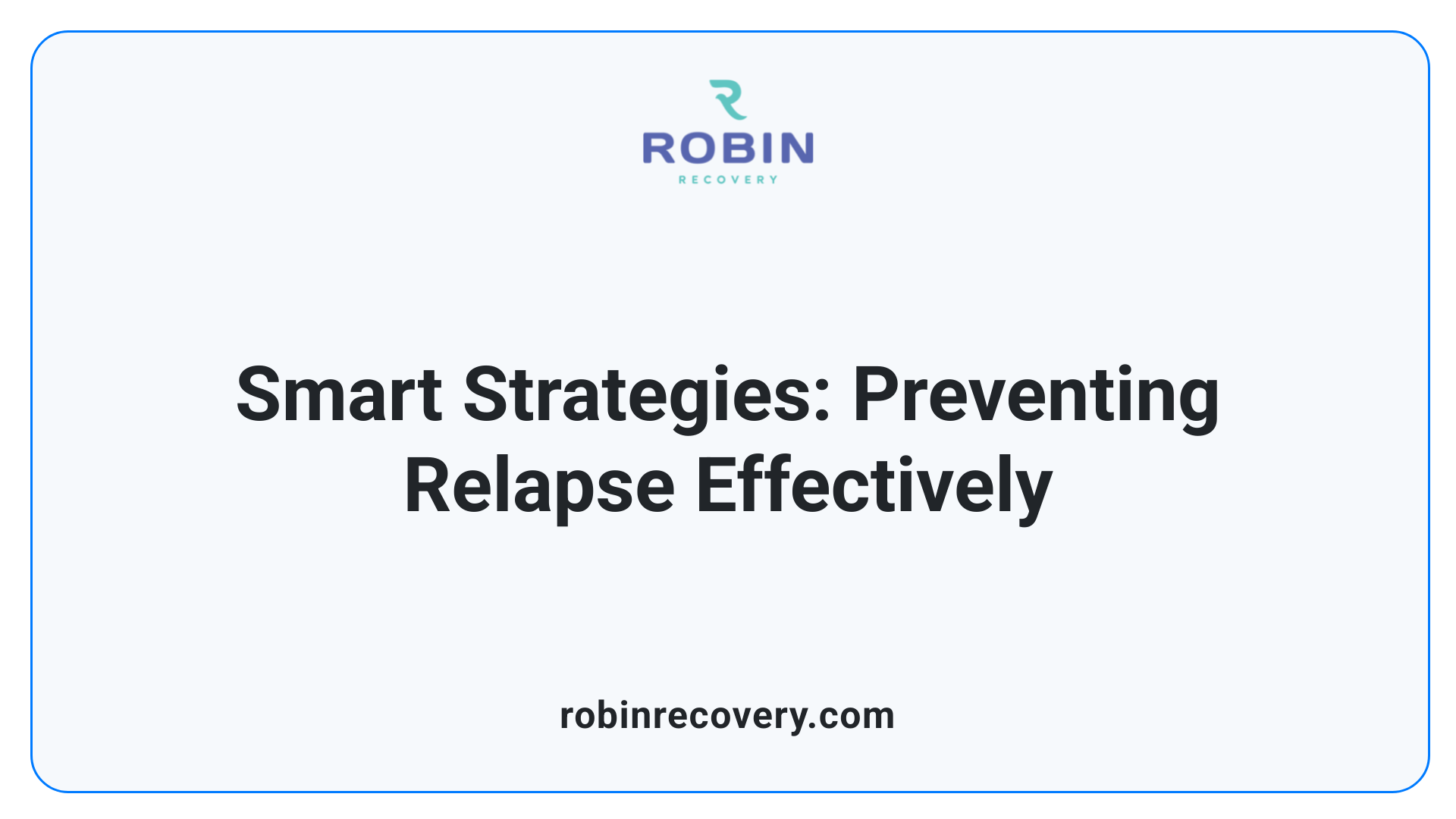
What strategies are effective for preventing and treating relapse?
Effective strategies for preventing and treating relapse in individuals recovering from substance use disorders involve a comprehensive approach. This entails recognizing and managing triggers, enhancing coping skills, and building a robust support network.
Early intervention is crucial—relapse is both an event and a process, commonly signaled by early warning signs such as cravings and emotional distress. Identifying these signs can enable individuals to take proactive measures before a full-blown relapse occurs.
Education plays a vital role in safety during recovery, especially regarding overdose risks after periods of abstinence. Individuals must understand that their tolerance decreases significantly, making them more susceptible to overdose if they return to previous use levels.
Incorporating holistic practices can also be beneficial. Mindfulness meditation, yoga, and regular physical activity have shown promising effects in managing cravings and reducing stress, which are often triggers for relapse.
Additionally, addressing any co-occurring mental or physical health conditions is essential. Medication management can be crucial here, with medications tailored to assist in managing such conditions, ultimately supporting a sustainable recovery process.
Understanding and managing relapse triggers
Several triggers can lead to relapse, including emotional distress, social pressures, and environmental cues associated with substance use. Strategies to manage these triggers might include developing coping mechanisms through therapies such as Cognitive Behavioral Therapy (CBT) which focuses on altering negative thought patterns.
Another strategy is participating in support groups where individuals can share experiences and strategies for handling common triggers. Building a strong social support system helps maintain motivation during challenging times.
Strategies to enhance recovery
Combining behavioral strategies with medication can significantly improve outcomes. Medication-assisted treatment (MAT) helps tackle withdrawal symptoms and cravings, thereby making the process of recovery more manageable. Using medications like naltrexone for alcohol dependence or buprenorphine for opioid use disorder helps reduce cravings and supports long-term recovery.
Regular evaluations and adjustments to treatment plans, along with ongoing counseling, ensure that recovery remains effective and responsive to the individual’s needs. This holistic approach is vital in minimizing the risk of relapse and fostering a healthier lifestyle.
Understanding Triggers and Building Resilience
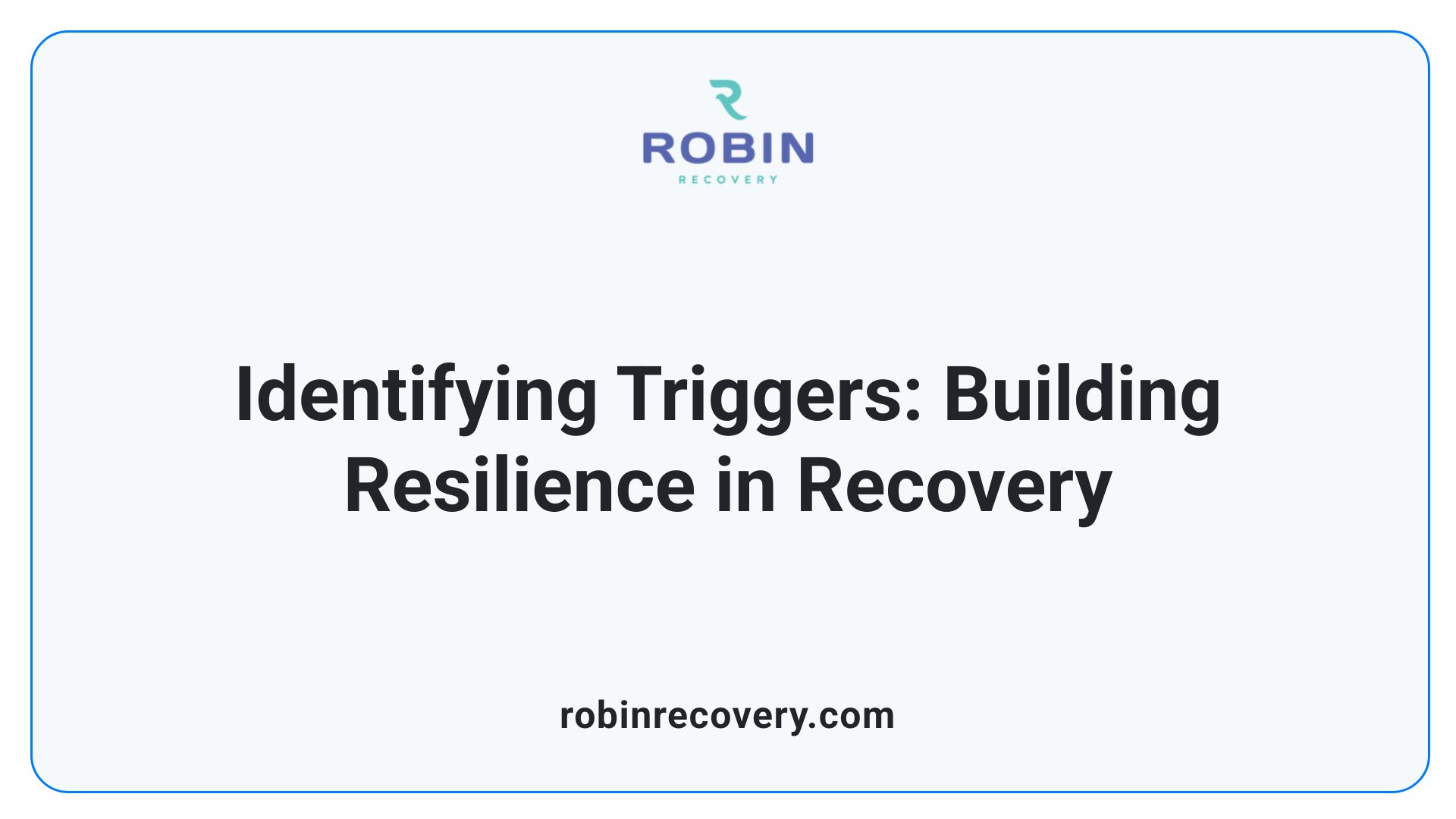
What are the factors in relapse prevention?
Effective relapse prevention involves a comprehensive approach. Key components include drug addiction counseling, which empowers individuals to manage emotional challenges and make informed decisions throughout their recovery. Recognizing triggers—specific people, situations, or emotions that may prompt cravings—is critical for staying sober.
Identifying common triggers
Common triggers associated with relapse include:
- Stressful life events or daily routines
- Social situations where substance use occurs
- Emotional upheaval such as grief or anger
- Environmental cues, like being in a place linked to past substance use
- Peer pressure from friends or family
Being aware of these triggers allows individuals to plan effectively, developing strategies to either avoid these situations or cope with them without resorting to substance use.
Developing coping strategies for long-term recovery
Building effective coping strategies can significantly reduce the chances of relapse. Here are some actionable steps:
- Create a support network: Engage family, friends, and support groups to provide encouragement and accountability.
- Establish healthy routines: Participate in positive activities and hobbies to occupy time and mind.
- Practice stress management: Techniques such as meditation, yoga, or regular physical activity can help manage stress without substances.
- Reflect and plan: Develop a personalized relapse prevention plan, including identification of triggers and coping strategies.
By integrating these strategies into daily life, individuals can strengthen their resilience against relapse, promoting long-term recovery and overall well-being.
Medications for Preventing Drug Dependence Relapse
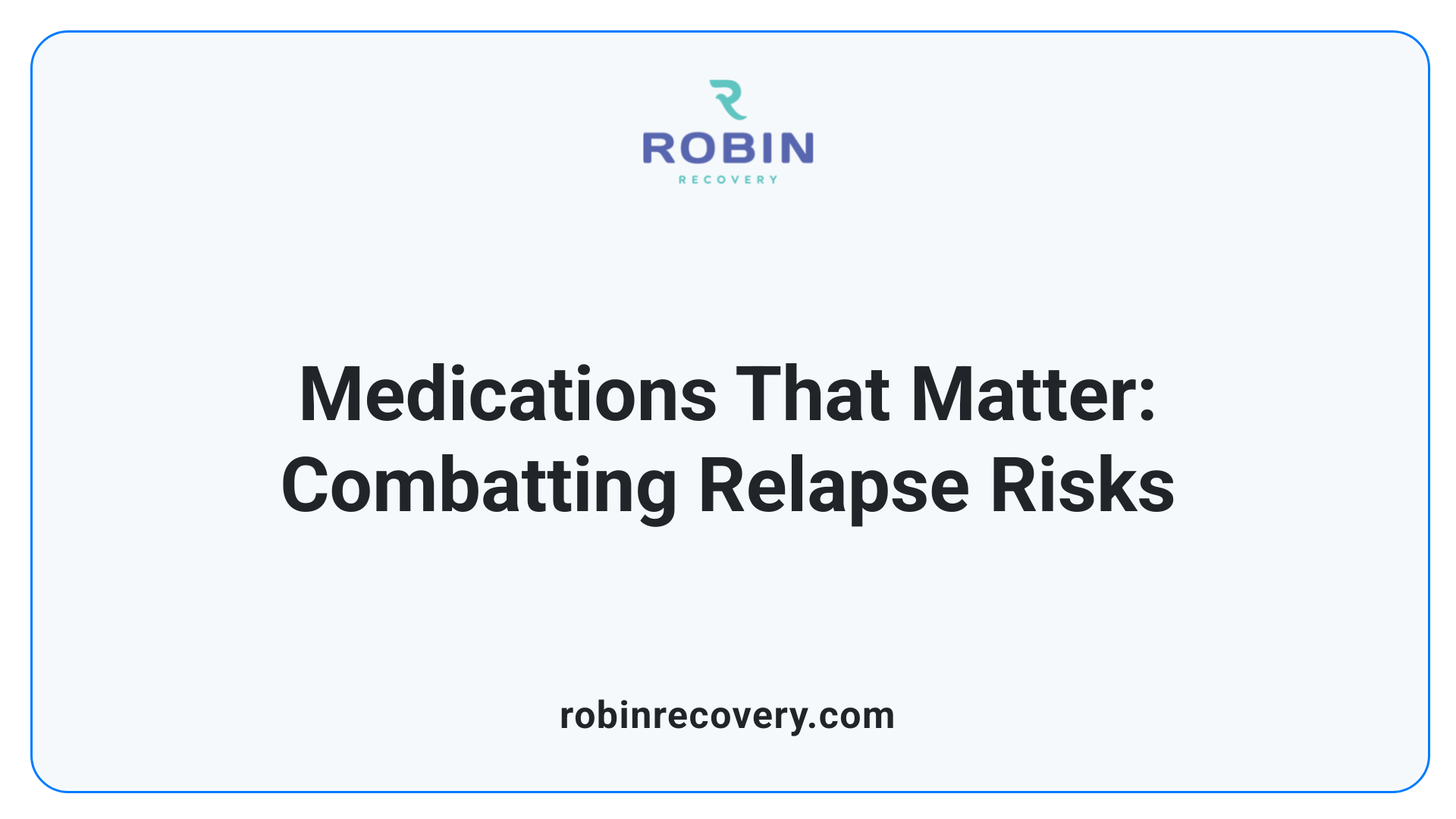
What medications are used to prevent relapse in drug dependence?
Medications play a significant role in preventing relapse in individuals recovering from drug dependence. Different substances require varied pharmacological approaches:
- Alcohol Dependence:
- Disulfiram (Antabuse): Causes adverse reactions when alcohol is consumed, enhancing commitment to sobriety.
- Naltrexone (Vivitrol): Reduces cravings and the number of drinking days by blocking alcohol's rewarding effects.
- Acamprosate (Campral): Helps alleviate long-lasting withdrawal symptoms such as insomnia and anxiety.
- Opioid Dependence:
- Methadone: Provides a stabilizing effect, suppressing withdrawal symptoms and cravings.
- Buprenorphine: Helps maintain recovery by targeting similar brain receptors affected by opioids.
- Nicotine Dependence:
- Bupropion: Assists in managing cravings associated with nicotine withdrawal.
Research is also exploring the use of Nicotinamide Adenine Dinucleotide (NAD+) in helping manage cravings and withdrawal symptoms, suggesting it might complement traditional therapies.
Role of medication-assisted treatment (MAT)
Medication-assisted treatment (MAT) integrates medications with behavioral therapies to address the complex aspects of addiction recovery. MAT can significantly enhance treatment outcomes by:
- Managing Withdrawal Symptoms: Medications like benzodiazepines during alcohol detox, for example, prevent dangerous withdrawal effects, supporting a safer recovery process.
- Reducing Cravings: Long-term medications like naltrexone or buprenorphine maintain recovery state by decreasing overall cravings and preventing relapse.
- Supporting Behavioral Therapies: Studies indicate that combining medication with outpatient therapies such as cognitive-behavioral therapy (CBT) creates a comprehensive treatment strategy that effectively reduces relapse rates.
In summary, a personalized approach combining therapy and medication management is pivotal in supporting recovery and minimizing relapse risks.
Connecting Medication Management to Long-Term Recovery Success
Impact of medication management on recovery outcomes
Medication management is an essential aspect of addiction recovery, particularly in preventing relapse after detoxification. Medications help alleviate withdrawal symptoms and cravings, crucial for sustaining sobriety. Research indicates that individuals participating in medication-assisted treatment (MAT), such as buprenorphine, naltrexone, and acamprosate, have significantly improved recovery rates. For instance, studies show that retention in substance abuse programs can increase by up to 74%, emphasizing the role of medication in maintaining engagement in recovery programs.
Integrating medication with behavioral therapies
Combining pharmacological treatments with behavioral therapies, like cognitive-behavioral therapy (CBT), enhances treatment efficacy. Medications address the biochemical aspects of addiction, while behavioral therapies tackle the psychological components, helping patients manage emotions and develop coping strategies. This dual approach addresses the complex nature of addiction, making recovery more achievable. By working together, these strategies can help individuals navigate triggers and support a sustained recovery, thus minimizing the likelihood of relapse during the challenging transitional period post-detox.
The Interplay of Medication and Cognitive-Behavioral Therapy
Role of cognitive-behavioral therapy (CBT) in addiction treatment
Cognitive-behavioral therapy (CBT) is a leading approach in addiction recovery, focusing on identifying and modifying negative thought patterns that contribute to substance use. This therapeutic technique equips individuals with coping strategies to handle triggers and stressors that could lead to relapse.
By helping patients recognize emotional and behavioral cues that precede substance use, CBT plays a pivotal role in cultivation resilience and enhancing self-efficacy during recovery. The structured environment of CBT sessions fosters self-reflection and accountability, which is essential for achieving sustained sobriety.
Enhancing medication effectiveness with therapy
The integration of medication management with CBT can significantly amplify treatment outcomes for individuals struggling with addiction. Medications such as naltrexone and buprenorphine are often prescribed to help control cravings and withdrawal symptoms, creating a smoother transition through recovery.
When combined with the behavioral strategies offered by CBT, patients can better navigate the psychological aspects of their addiction. This holistic approach not only addresses the physical dependence on substances but also targets the underlying psychological issues, ultimately improving long-term recovery prospects.
Key Takeaway
Ultimately, combining evidence-based medication with therapeutic techniques like CBT offers a comprehensive framework, enhancing the likelihood of maintaining sobriety and preventing relapse.
Managing Relapse Triggers with Medications Post-Detox
Importance of Addressing Triggers After Detox
Post-detox, managing relapse triggers is crucial for maintaining sobriety. Triggers, including stress, cravings, and social situations, can significantly increase the likelihood of relapse. Research suggests that 40 to 60% of individuals with substance use disorders may experience a relapse, underscoring the need for effective strategies to combat these triggers.
Understanding the emotional and psychological challenges faced during recovery is essential. Medication management plays a vital role in this phase. By effectively using medications that reduce cravings and withdrawal symptoms, individuals can better navigate their recovery journey.
Strategies Involving Medication and Counseling
Combining medication management with counseling creates a comprehensive approach to relapse prevention. Medications like naltrexone and buprenorphine can mitigate cravings and prevent extreme withdrawal symptoms. This pharmacological support acts as a buffer against relapse triggers.
Counseling, particularly cognitive-behavioral therapy (CBT), complements medication strategies by helping patients develop coping mechanisms and resilience against stressors. Integrated approaches that incorporate both pharmacological and psychosocial strategies have shown to enhance recovery outcomes significantly, allowing individuals to achieve sustained sobriety.
Holistic Approaches Complementing Medication Management
Integration of Holistic and Pharmacological Methods
Medication management in addiction recovery is most effective when combined with holistic approaches. This integration facilitates a comprehensive treatment plan addressing both psychological and physical health needs. Cognitive-behavioral therapy (CBT) is one such method that equips individuals with coping strategies to manage negative thought patterns, enhancing the effectiveness of pharmacological treatments.
In addition to CBT, support groups and counseling help create a robust support network for individuals in recovery. These psychosocial components work synergistically with medications, such as methadone for opioid use disorder (OUD) and acamprosate for alcohol use disorder (AUD), to promote sustained recovery and minimize the risk of relapse. By tackling both cravings and psychological factors, patients experience a more holistic recovery journey.
Supporting Recovery with a Whole-Patient Approach
A whole-patient approach in treatment acknowledges the interconnectedness of mental health and substance use disorders. This involves a focus on both medication and therapy, as each affects the other. For instance, antidepressants or anti-anxiety medications may address underlying mental health conditions, which can be triggers for substance use.
Moreover, a personalized treatment plan ensures that each patient's unique needs are met. Regular evaluations of medication efficacy and adjustments to convey optimal support are crucial. This holistic lens not only facilitates the management of withdrawal symptoms and cravings but also reinforces long-term recovery by encouraging patients to engage in healthy coping strategies and social supports.
Ongoing Support and Aftercare: Breeding Grounds for Sobriety
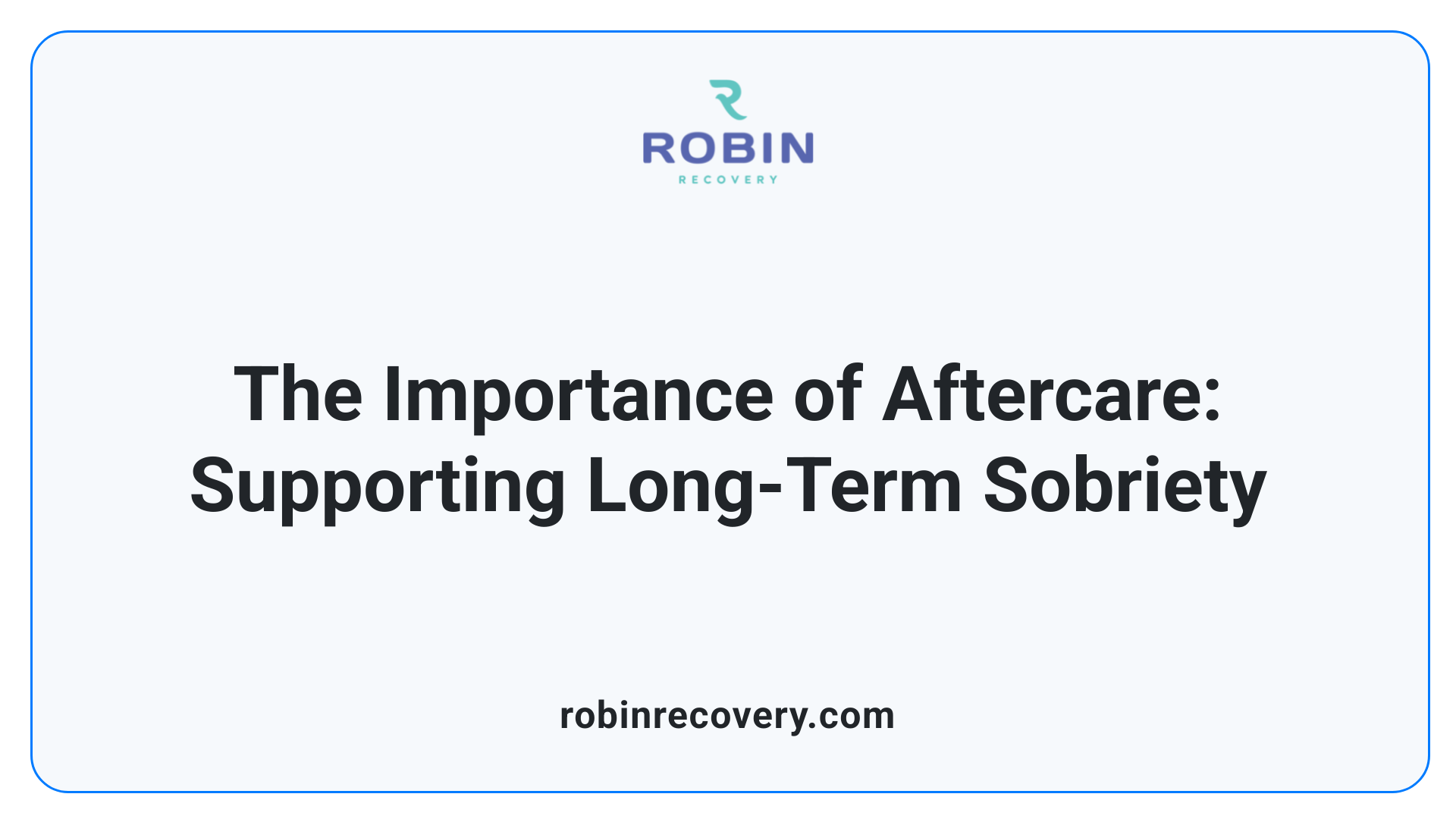
Role of Continued Medication Support
Continued medication support after detoxification is vital for individuals in recovery from addiction. Medications such as naltrexone, acamprosate, and buprenorphine are crucial in managing cravings and withdrawal symptoms, which can significantly decrease the risk of relapse. Ongoing prescriptions help stabilize patients, assist in regularizing their brain functions, and make the return to a drug-free life more sustainable. Studies indicate that personalized medication management increases retention rates in substance abuse treatment programs, underscoring its importance.
Importance of Aftercare in Preventing Relapse
Aftercare is another critical component in the relapse prevention strategy. It encompasses various supportive options, including 12-step meetings, sober living environments, and ongoing counseling. These resources provide individuals with essential support networks, helping them navigate the challenges of daily life while maintaining sobriety. Research shows that a structured aftercare program can enhance the effectiveness of medication management, creating a comprehensive approach to recovery that addresses both psychological and physical needs. Together, these elements forge a robust foundation, allowing individuals to cultivate skills and resilience necessary for lasting recovery.
Conclusion: Collaborative Efforts in Medication Management
Preventing relapse after detox requires collaborative efforts that harness the power of medication management alongside therapy and aftercare strategies. As seen throughout this discourse, the strategic use of medications post-detox is pivotal in managing cravings and withdrawal symptoms, serving as a bedrock for sustainable recovery. By integrating these pharmacological interventions with cognitive-behavioral therapy and holistic approaches, individuals fighting substance use disorders can build formidable resilience against relapse, paving the path to long-term healing and independence.
References
- Addiction Relapse Prevention - StatPearls - NCBI Bookshelf
- Treatment and Recovery | National Institute on Drug Abuse (NIDA)
- Relapse Prevention Plan: Strategies and Techniques for Addiction
- Relapse - Alcohol and Drug Foundation
- Medications for Substance Use Disorders - SAMHSA
- What Is Medication Management? | Addiction Recovery Idaho
- How are medications and devices used in drug addiction treatment?
- Addiction Relapse: Risk Factors, Coping & Treatment Options
